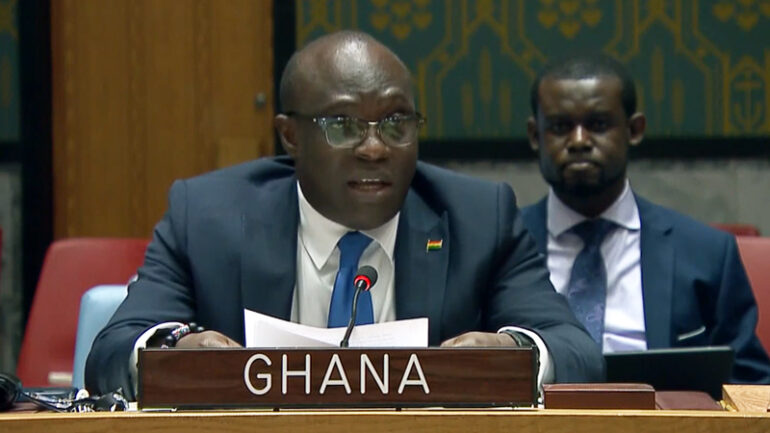During the Security Council Briefing on the Peacebuilding and Sustaining Peace

Mr. President,
At the outset, I would like to thank Ambassador Osama Abdelkhalek of Egypt, former Chair of the Peacebuilding Commission (PBC) as well as Mr. Monwar Hossain, the Chargé d’Affaires of Bangladesh and current Chair of the Commission for their insightful briefings, in support of the annual report presented on the activities of the PBC. Undoubtedly, our common determination to evolve the architecture and approach to sustaining peace in all parts of the world, make the PBC an important advisory body for pursuing an integrated and coherent global effort in support of national actions for addressing the multidimensional challenges that face several countries and regions.
Ghana therefore welcomes the activities undertaken by the PBC in 2021, including the convening of 29 meetings as well as discussions on 13 different countries and regional issues. The coverage of new topics by the Commission such as peacekeeping and peacebuilding, disarmament, demobilisation, and reintegration; alongside those on the political, governance, security, socio-economic and humanitarian situations, is commendable. We are also satisfied with the increase in the number of thematic and cross-cutting issues considered, up 40 percent compared to about 15 percent in 2018 and encourage the deepening of the partnerships with the Multilateral Development Banks, the International Financial Institutions, and regional organisations and institutions such as the African Union and ECOWAS.
Mr. President,
The question of financing for the critical role of the PBC continues to remain a daunting challenge. Pursuant to the twin resolutions of the General Assembly (A/RES/75/201) and the Security Council (S/RES/2558) and as affirmed by the Member States during the High Level Meeting on Peacebuilding Financing last April, there is the need to address the concern over what the Secretary-General describes in his report as “… too little progress on adequate, predictable and sustained financing for peacebuilding”. The provision of adequate resources to the Peacebuilding Fund translates into greater investments in prevention and in peacebuilding, which is a key component of the New Agenda for Peace within the context of Our Common Agenda. Urgent action is required in this regard.
While encouraging an expanded donor base to the Fund, which in 2021 was around $178 million but still fell short of the SecretaryGeneral’s target of $500 million annually, we believe that one of the viable means of providing the PBF with a consistent baseline of funding is through UN assessed contributions. This approach which was originally proposed by an independent Advisory Group of Experts for the 2015 Review of the Peacebuilding Architecture remains relevant and we, therefore, welcome the SecretaryGeneral’s call for an annual appropriation of $100 million to the Peacebuilding Fund (PBF) starting from 1 st July 2022 to 30th June 2023.
Mr. President,
On working methods, we welcome the PBC’s practice of submitting letters or notes of advice ahead of Security Council meetings. This, if deepened, would undergird the relations required by the Council with the PBC, in a manner that helps the PBC to impact the Council’s work as well as contribute to addressing the underlying causes of the conflicts on the Council’s agenda. Furthermore, the PBC’s ability to bring together diverse stakeholders and non-UN actors is an added advantage which is critical to the efforts of sustaining peace and promoting development in conflict affected countries and regions. This is no mean achievement and should be sustained and enhanced. It is also proven that empowering women through meaningful participation in
peacebuilding helps to deepen the effectiveness and sustainability of peacebuilding measures and in this regard, we welcome the PBC’s intervening role in targeting the youth, women and agricultural selfemployment, among others. We encourage further measures to empower women and the youth to enhance their full and meaningful participation in all political processes, including in elections and transitions. The Commission’s involvement in climate-related peace and development interventions as well as in the promotion of community-based dispute resolution mechanisms is equally remarkable and should be encouraged.
Mr. President,
Before concluding, let me indicate that from the national context, Ghana remains committed to peacebuilding efforts as evidenced in her establishment of a National Peace Council (NPC), which, among others, develops and enhances national mechanisms and processes for conflict prevention and the building of sustainable peace. Presently, in addition to budgetary allocations, we have established an accompanying Peace Fund to supplement peacebuilding activities across all the 16 regions and the 260 districts of Ghana.
Finally, we look forward to early conclusion of the negotiations on the draft resolution on peacebuilding financing being co-facilitated by Kenya and Sweden. We are optimistic that the resolution when adopted would provide a good and concrete basis for addressing the financing challenges. We note the cost-effectiveness of peacebuilding financing and encourage greater support in that regard to enable the dividends of the efforts for peace to be realised.
I thank you
